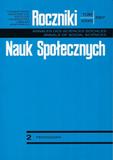Jana Pawła II dorobek zamknięty, dzieło otwarte
John Paul II the Closed Achievements and the Open Work
Author(s): Piotr Paweł GachSubject(s): Social Sciences
Published by: Towarzystwo Naukowe KUL & Katolicki Uniwersytet Lubelski Jana Pawła II
Keywords: John Paul II; pope; evangelical pedagogy; dimensions of solidarity; diagnoses and co-operation in education
Summary/Abstract: The author begins with a question: who was John Paul II? First he makes a review of various terms used to describe the Pope-Pole. They are found in his many biographies, studies, albums, learned journals, press publications, radio and television broadcasts, and characterisation delivered at learned symposiums in Poland. The author closes this review with a statement that the personality and activity of John Paul II transcends the unambiguous terms used by contemporary journalists, politicians, biographers, and historians. He cannot be enclosed in one field of meaning, or even reduced to several terms. John Paul II spoke on the formation of teachers and educators, the necessity to prepare them for their job from many points of view and to equip them with educational and didactic skills. He spoke about the serious and subtle question of their vocation and even their apostleship, the necessity to fulfil essential tasks and the need to co-operate with their pupils’ parents. These sentences, often quoted in the press, suffice to define the Pope as a good pedagogue, educator, and teacher both in theory and practice. Starting from the personalistic vision of man, supplemented by the axiological, normative, social and cultural, and religious approaches, John Paul II arrives the overall vision of Christian pedagogy. According to him, education is a continual process that encompasses the formation of personality and serves to build the civilisation of life, truth, and love. That process leads to a full mental development and to engagement in everyday matters. It takes places in various milieus: in the family, social groups, the nation, the state, and the Church. The figure of John Paul II can be seen here as: a teacher, theorist of education, visionary who shows the Church’s stance on education, a pedagogue well-aware of the didactic methods and means by which to reach the listener, an author of the educational programme for a definite group of people, for families, and the whole nations. The exceptional character of his life consists not only in the diverse form of his teaching. He also set on apostolic journeys and was an exemplary figure when he showed us how to suffer illnesses, and how he coped with the assault on his life. Journalists and biographers admired him for his words about God, man, societies, history, and the contemporary times. He regularly met with the suffering and the sick, talked with them, consoled brought, and administered the Holy Communion to them. Following the Pope’s order, a “Gift of Mary” hostel for the poor was built in the Vatican. The Pope showed pedagogical and educational values. John Paul II influenced the masses of people and small groups, families, and the lonely. He encouraged them to creativity, to various activities, to show mutual help, and to kindness. Thereby he encouraged people to seek a more satisfactory model of life, in which activity, creativity, and solidarity would be basic elements.
Journal: Roczniki Nauk Społecznych
- Issue Year: 35/2007
- Issue No: 2
- Page Range: 109-121
- Page Count: 13
- Language: Polish

